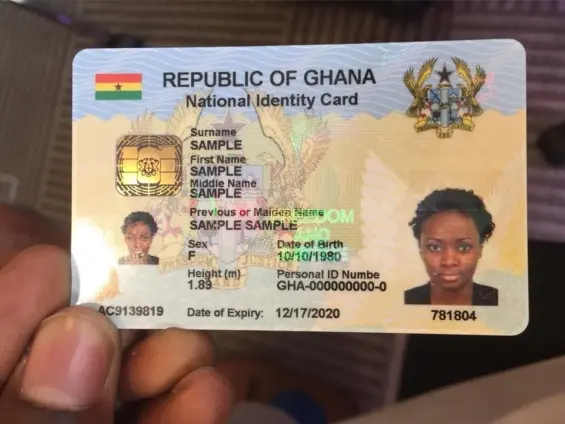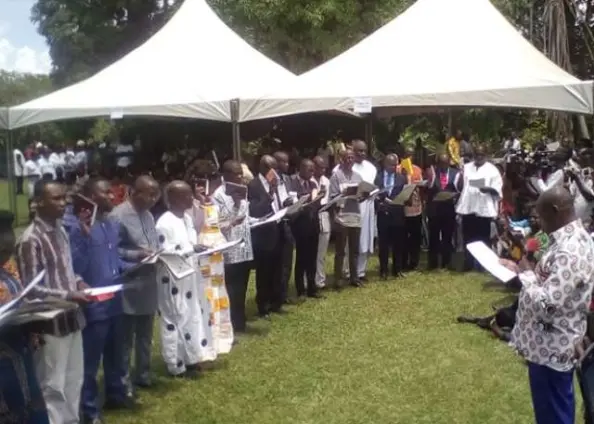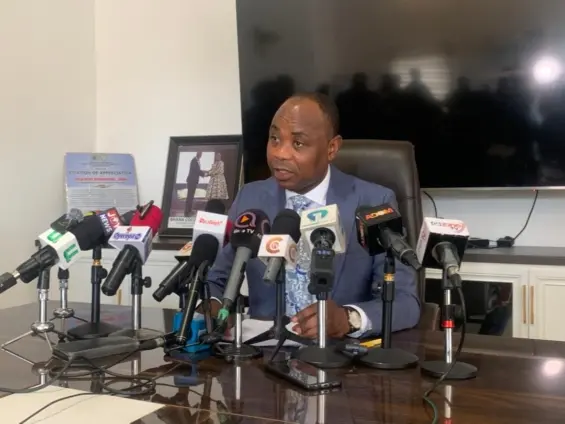For 63 graduates of the University of Cape Coast now residing within the walls of Nsawam Medium Security Prison, a bureaucratic hurdle stands between them and their mandatory national service. These inmates, having earned their degrees, find themselves unable to fulfill this civic duty because they lack a crucial piece of identification: the Ghana Card. This ID is now a prerequisite for national service, highlighting a systemic issue that prevents these graduates from contributing to Ghana’s development.
The absence of Ghana Cards for these graduates raises questions about access to essential services within the prison system and broader implications for rehabilitation. This article explores the challenges faced by these graduates, examines the reasons behind the Ghana Card issuance delays, and investigates potential solutions proposed by the Parliamentary Committee on Human Rights, drawing from official reports and statements by key figures.
The critical role of the Ghana Card in modern Ghanaian society cannot be overstated. It has become essential not only for national service but also for accessing various government services, opening bank accounts, and participating in other civic activities. Without it, these prison graduates are effectively locked out of opportunities to reintegrate into society upon their release.
The requirement for a Ghana Card to undertake national service serves as the primary form of identification required for national service enrollment. Without a Ghana Card, graduates cannot complete the necessary registration and documentation for the service year. This barrier prevents prison graduates from fulfilling their civic duty and gaining valuable professional experience. For these graduates, national service represents a chance to apply their newly acquired knowledge, gain professional experience, and contribute to the nation’s workforce. Depriving them of this opportunity not only hinders their personal development but also represents a loss for the country.
The plight of the Nsawam Prison graduates came to light through an inmate who has served 13 years. He brought this issue to the attention of the Parliamentary Committee on Human Rights during a recent visit. He pleaded with the Committee to intervene to enable them to undertake their service.
According to DDP Patrick Thomas Seidu, the Eastern Regional Commander and Officer in charge (OIC) of the Nsawam Medium Security Prison, the National Identification Authority (NIA) has prioritized children’s registration, with no specific date set for inmates’ registration. DDP Seidu confirmed the claims to the Daily Graphic, underscoring the urgency of the situation.
The challenges extend beyond the Ghana Card issue. The Nsawam Medium Security Prison faces severe overcrowding and resource constraints that further compound the problems faced by inmates.
Originally built for 717 inmates, the prison now houses 3,548, leading to severe overcrowding. Dormitories designed for 20 inmates now accommodate 430. Compounding these issues is inadequate funding, with the feeding grant per inmate remaining at GH¢1.80 since 2011. The prison also faces significant financial strain, owing GH¢200,000 for drugs and GH¢506,203 to the National Health Insurance Scheme.
The Parliamentary Committee on Human Rights, led by Chairman Ernest Yaw Anim, conducted a familiarization visit to the prison to assess conditions and compliance with human rights standards. Responding to the dire situation, the Committee has called for immediate government action. Mr. Anim urged immediate government action to improve feeding rates and settle outstanding bills, emphasizing the importance of upholding the rights of inmates. “These bills need to be settled as soon as possible, so that the right to health, the right to life by these inmates will be taken care of and not be violated,” said Mr. Anim.
MP Francis-Xavier Sosu, a human rights lawyer, suggested presidential amnesty for long-serving inmates, given Ghana’s abolition of the death penalty. This proposal aims to alleviate overcrowding and provide a path for rehabilitation for those who have served considerable time. The Committee plans to formally petition the President and Attorney-General for case reviews and timely intervention, signaling a commitment to addressing the systemic issues within the prison system.
Addressing these challenges requires a multi-pronged approach. Prioritizing the registration of prison inmates for Ghana Cards is essential to enable their participation in national service. Increased funding must be allocated to address overcrowding and improve feeding grants for inmates. A policy review is needed to ensure compliance with human rights standards and promote rehabilitation.
The denial of national service opportunities for Nsawam Prison graduates due to Ghana Card issues highlights the urgent need for systemic reforms within the prison system. Addressing these challenges requires collaborative efforts from the government, the National Identification Authority, and the Parliamentary Committee on Human Rights. By prioritizing the issuance of Ghana Cards, improving prison conditions, and considering amnesty for long-serving inmates, Ghana can uphold human rights principles and foster a more inclusive society. Further investigation into the implementation of these solutions is warranted to ensure their effectiveness and sustainability.
Image Source: MYJOYONLINE






















